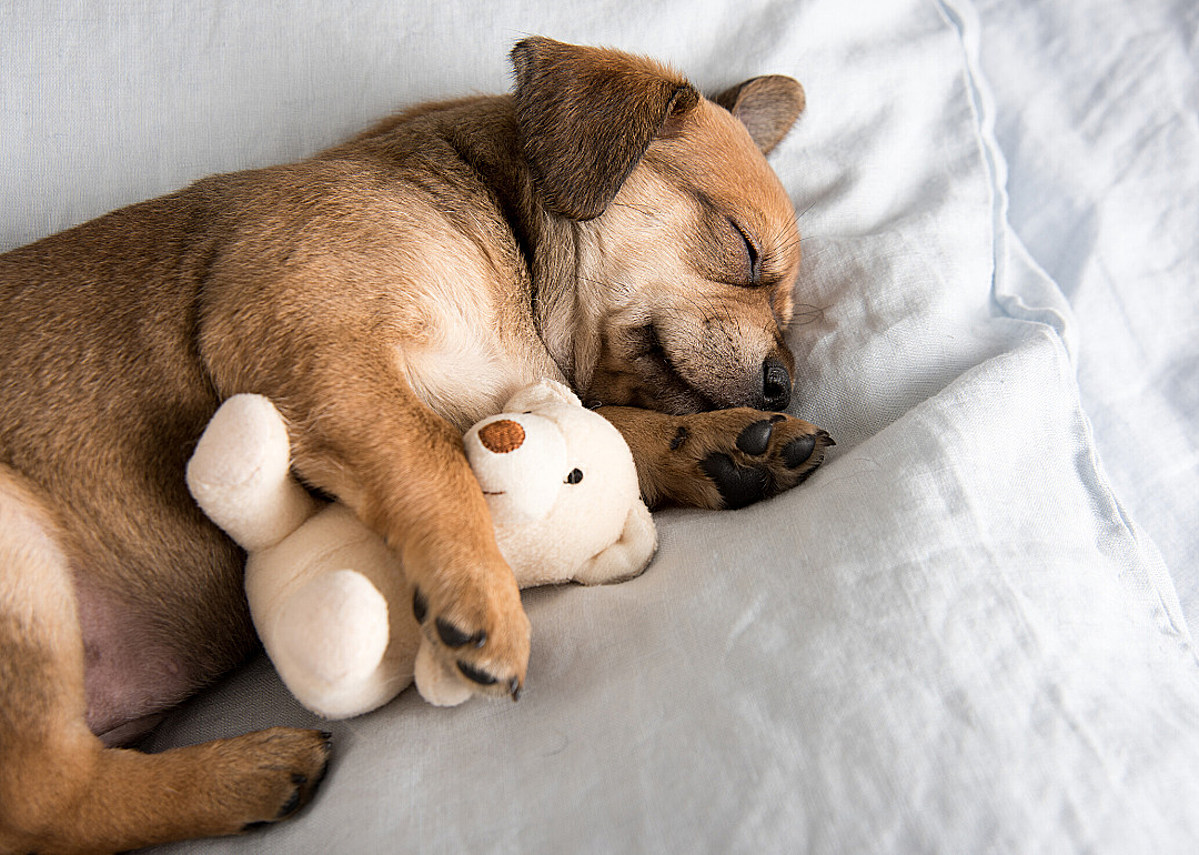
Welcoming a new puppy into your home is an exciting adventure filled with adorable moments and new experiences. As a puppy parent, you may have noticed some unique behaviors, one of which might be the soft symphony of snoring that accompanies their naptime. In this article, we’ll explore the fascinating world of puppy sleep habits, focusing on the common question: “Do puppies snore when they sleep?”
Why Do Puppies Snore?

Natural Sleep Patterns
“Natural Sleep Patterns” is integral to comprehending the intricacies of both human and animal sleep cycles. This term refers to the inherent and automatic ways in which living organisms naturally experience the different stages of sleep. In the context of humans, natural sleep patterns encompass the cyclical progression through various sleep phases, including light sleep, deep sleep, and REM (Rapid Eye Movement) sleep.
Embracing these innate patterns is crucial for promoting overall well-being, as it aligns with the body’s physiological and psychological needs during rest. In the animal kingdom, such as with puppies, recognizing and respecting their natural sleep patterns is equally vital for ensuring optimal health and fostering a harmonious relationship between caregivers and their furry companions.
Size and Breed Influence
The dimensions and breed of a puppy play a pivotal role in shaping their unique characteristics, including sleep patterns and behaviors. The size of a puppy, whether it’s a petite breed or a larger one, significantly influences how they rest. Smaller breeds may exhibit distinct snoring patterns compared to their larger counterparts.
Additionally, the breed itself can contribute to variations in snoring tendencies. Brachycephalic breeds, characterized by short noses and flat faces, often experience different respiratory challenges that may influence the intensity of their snoring. Understanding the interplay between size and breed is key to comprehending the diverse sleep behaviors exhibited by our furry companions.
Health Factors
Nasal Congestion
Just like humans, puppies can experience nasal congestion. This may be more pronounced during puppyhood when their immune systems are still developing, leading to occasional snoring.
Respiratory Issues
Certain health conditions, such as respiratory infections or allergies, can contribute to snoring in puppies. It’s essential to monitor for any signs of distress during sleep.
Sleeping Positions and Snoring
Back Sleeping vs. Belly Sleeping
The position in which puppies snore sleeps can influence the intensity of their snoring. Back sleeping may open up the airways, reducing snoring, while belly sleeping might amplify the sounds.
Impact on Snoring
Various factors can influence a puppy’s snoring habits, which is crucial for responsible pet parenting. The sleeping position adopted by your furry friend plays a pivotal role in determining the intensity of their snoring. Whether they prefer sleeping on their back or curled up on their belly can significantly impact the symphony of sounds emitted during sleep.
By exploring the influence of sleeping positions on snoring, pet owners can gain valuable insights into their puppy’s nighttime behavior. This knowledge empowers them to create a conducive and comfortable sleeping environment, fostering not only restful slumber for their beloved pet but also a quieter and more peaceful atmosphere for the entire household.
Developmental Stages
Puppyhood Sleep Patterns
Puppies, much like human babies, have different sleep patterns during their early months. Understanding these patterns can help discern between normal snoring and potential issues.
Changes as They Grow
As puppies grow, their sleep patterns evolve. What may seem like excessive snoring in their early weeks may normalize as they mature. Regular observations are key to gauging these changes.
Do All Puppies Snore?
Variability Across Breeds
The propensity to snore varies across different breeds. While some breeds are more prone to snoring due to their anatomy, individual differences also play a significant role.
Individual Differences
“Individual differences” refers to the unique variations and distinctions that exist among individuals within a particular group or population. These differences encompass a broad spectrum, including variations in personality traits, cognitive abilities, behaviors, and physical characteristics. Each person possesses a distinct combination of genetic, environmental, and experiential factors that contribute to their individuality.
Individual differences is crucial in fields such as psychology, education, and human resources, as it acknowledges and embraces the diversity of human experiences. Recognizing and appreciating these differences fosters a more inclusive and equitable approach in various aspects of life, emphasizing the importance of tailored and personalized strategies to accommodate the diverse needs and strengths of individuals.
Environmental Factors
Sleeping Conditions
Creating a comfortable and quiet sleeping environment for your puppy can impact their snoring. Ensure that their sleeping area is cozy and free from disturbances.
Temperature and Humidity
Extreme temperatures or dry air can contribute to snoring. Maintaining an optimal sleeping environment helps in minimizing potential snoring triggers.
How Loud is Too Loud?
Normal Snoring vs. Concerning Sounds
Distinguishing between normal snoring and sounds that may indicate respiratory distress is crucial. Understanding the nuances can guide you in assessing your puppy’s well-being.
Seeking Professional Advice
If you need more clarification about the intensity or frequency of your puppy’s snoring, consult your veterinarian. They can provide insights and determine if further evaluation is necessary.
Tips for Managing Puppy Snoring
Creating a Comfortable Sleep Environment
Invest in a comfortable bed and ensure your puppy feels secure in their sleeping space. This can contribute to more restful sleep and potentially reduce snoring.
Regular Vet Check-ups
Routine veterinary check-ups are essential to monitor your puppy’s overall health. Discussing sleep patterns and potential concerns with your vet can help address any underlying issues.
Common Myths About Puppy Snoring
Debunking Misconceptions
Separating fact from fiction is crucial when it comes to understanding puppy behaviors. We’ll debunk common myths associated with puppy snoring, providing a clearer picture of what’s normal.
Normal Puppy Behavior
Puppy snoring, in most cases, is a natural and harmless behavior. Understanding what constitutes normal puppy behavior can alleviate unnecessary worries.
The Role of Diet
Impact of Nutrition on Sleep
A well-balanced diet contributes to overall health, including sleep quality. Exploring the connection between nutrition and snoring can offer insights into potential dietary adjustments.
Special Diets for Snoring Prevention
Certain dietary components, such as anti-inflammatory ingredients, may contribute to reducing snoring. Consult your vet for advice on incorporating these elements into your puppy’s diet.
Training Techniques
Positive Reinforcement
Using positive reinforcement techniques can encourage desirable sleep behavior in puppies. Rewarding calm and quiet behavior reinforces good sleep habits.
Discouraging Unwanted Habits
Gently discouraging unwanted habits, such as excessive snoring, can be achieved through consistent training. Patience and positive reinforcement play key roles in shaping behavior.
When to Worry About Puppy Snoring
Recognizing Signs of Discomfort
While snoring is generally normal, signs of discomfort during sleep should not be ignored. Scrutinize your puppy’s overall behavior to ensure they are resting comfortably.
Seeking Veterinary Assistance
If you notice sudden changes in your puppy’s snoring or if they display signs of distress during sleep, seek prompt veterinary assistance. It’s always better to address concerns early on.
Conclusion
In conclusion, the sounds of a snoring puppy are often a charming and natural part of canine life. Understanding the various factors influencing puppy snoring can help you differentiate between normal sleep behavior and potential health concerns. Embrace the uniqueness of your puppy’s sleep symphony, but always remain vigilant to changes that may warrant professional attention.
FAQ
Why do Some Puppies Louder Than Others?
Puppies may snore louder due to breed differences, individual variations, or environmental factors.
Is Snoring a Sign of a Health Issue in Puppies?
While occasional snoring is normal, persistent loud snoring or signs of distress may indicate a health concern.
Can I Train My Puppy To Stop Snoring?
Training can influence sleep behavior, but complete cessation of snoring may not be realistic. Focus on creating a comfortable sleep environment.
Are Certain Breeds More Prone to Snoring?
Yes, certain breeds, especially brachycephalic breeds, are more prone to snoring due to their anatomy.
When Should I Seek Professional Help For My Puppy’s Snoring?
If you observe sudden changes, signs of discomfort, or persistent loud snoring, consult your veterinarian for guidance.








